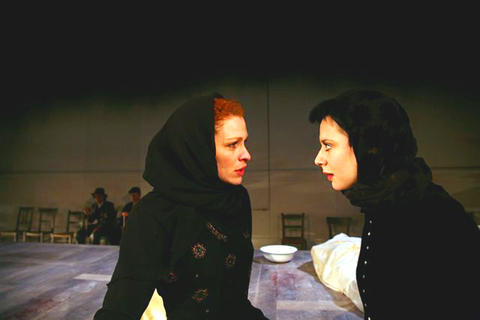Theater troupes from Germany, France, Israel and South Korea, as well as two from Taiwan, have drawn inspiration from Athol Fugard, Bernard-Marie Koltes, Sophocles, and Ingmar Bergman and others for this year's International Theater Festival.
Ticket sales have been brisk for the event, which will be held at the National Experimental Theater (國家實驗劇場) from Monday through April 13: Gutes Tun and Sizwe Banzi Is Dead (directed by world-famous theater innovator Peter Brook) have already sold out.
Sizwe Banzi Is Dead, a play written by Athol Fugard, is a morality tale about apartheid in South Africa's townships that focuses on identity, survival and race.

PHOTO: COURTESY OF NTCH
In the production, Siswe Banzi adopts the identity of a dead man so he can find a job and escape the grinding poverty of the slums. One day he enters a photography studio where he is forced to confront the deeper meaning of his actions. The performance focuses on the cost of freedom and the power of art to transcend oppression.
Roberto Zucco, written by Bernard-Marie Koltes and adapted from the original by Taiwan-based theater group Creative Society (創作社), was inspired by a real-life killer.
Directed by Wang Jia-ming (王嘉明), the plot of the 15-scene play follows the last years of serial killer Roberto Zucco's life and the motives behind his killing spree.
Three actors play 20 nameless characters and pull the audience along in an avant-garde plot that follows Zucco's prison break and subsequent crime rampage. No specific protagonist is ever seen or heard in the play, which incorporates several viewpoints and uses constantly changing scenes strewn with monologues. Performances begin on March 13.
In Gutes Tin, two women intend to do good by providing people with what they desire most. Those who want buns shall have them. Stewed apples, no problem. However, these two are not very serious and spend most of their time in front of a cabin singing, joking and brawling. Though the characters might not bring happiness to the world, Tismer's snappy dialogue in this mad comedy is sure to keep audiences crying with laughter.
Comedy is not on Hana Snir's radar. The Israeli director working in with Habimah National Theater and Cameri Theater is staging an updated version of Sophocles' tragedy Antigone.
The story revolves around Antigone, who defies human laws in order to follow a higher one. She chooses to bury her fallen brother, though he has been declared an enemy of the state by her uncle and is ineligible for any funeral rites.
Snir's adaptation from a translation by Shimon Bouzaglo is interesting because it sound like breaking news.
In Woyzeck, a shattered wooden chair represents a soldier's life. Written by Georg Buchner just before his death at the age of 23, the play is a tragedy about love, betrayal, jealousy and murder.
In the hands of South Korea's Sadari Movement Laboratory, however, chairs take on an added dimension conjuring up physical contexts and revealing the inner states of the characters. A riveting musical score by Astor Piazzolla accompanies the production, which begins on April 4.
Off Performance Workshop's (外表坊) adaptation of Ingmar Bergman's Scener Ur Ett Aktenskap (Scenes From a Marriage), which begins on April 10, makes up the final performance of the festival. The Taiwan-based theater group uses a somber interpretation of Bergman's tale of the vicissitudes of marriage and its eventual breakdown.
Tickets for the International Theater Festival are NT$500 to NT$1,000. All performances will be held at the National Experimental Theater, Taipei. Tickets can be bought at www.artsticket.com.tw.

Behind a car repair business on a nondescript Thai street are the cherished pets of a rising TikTok animal influencer: two lions and a 200-kilogram lion-tiger hybrid called “Big George.” Lion ownership is legal in Thailand, and Tharnuwarht Plengkemratch is an enthusiastic advocate, posting updates on his feline companions to nearly three million followers. “They’re playful and affectionate, just like dogs or cats,” he said from inside their cage complex at his home in the northern city of Chiang Mai. Thailand’s captive lion population has exploded in recent years, with nearly 500 registered in zoos, breeding farms, petting cafes and homes. Experts warn the

The unexpected collapse of the recall campaigns is being viewed through many lenses, most of them skewed and self-absorbed. The international media unsurprisingly focuses on what they perceive as the message that Taiwanese voters were sending in the failure of the mass recall, especially to China, the US and to friendly Western nations. This made some sense prior to early last month. One of the main arguments used by recall campaigners for recalling Chinese Nationalist Party (KMT) lawmakers was that they were too pro-China, and by extension not to be trusted with defending the nation. Also by extension, that argument could be

Aug. 4 to Aug. 10 When Coca-Cola finally pushed its way into Taiwan’s market in 1968, it allegedly vowed to wipe out its major domestic rival Hey Song within five years. But Hey Song, which began as a manual operation in a family cow shed in 1925, had proven its resilience, surviving numerous setbacks — including the loss of autonomy and nearly all its assets due to the Japanese colonial government’s wartime economic policy. By the 1960s, Hey Song had risen to the top of Taiwan’s beverage industry. This success was driven not only by president Chang Wen-chi’s

Last week, on the heels of the recall election that turned out so badly for Taiwan, came the news that US President Donald Trump had blocked the transit of President William Lai (賴清德) through the US on his way to Latin America. A few days later the international media reported that in June a scheduled visit by Minister of National Defense Wellington Koo (顧立雄) for high level meetings was canceled by the US after China’s President Xi Jinping (習近平) asked Trump to curb US engagement with Taiwan during a June phone call. The cancellation of Lai’s transit was a gaudy